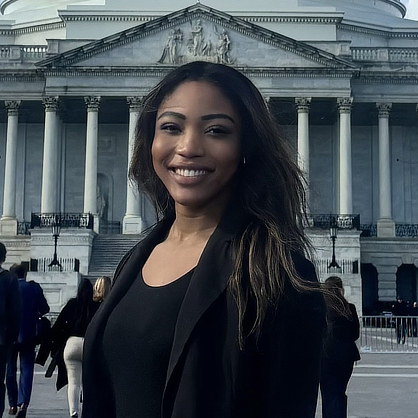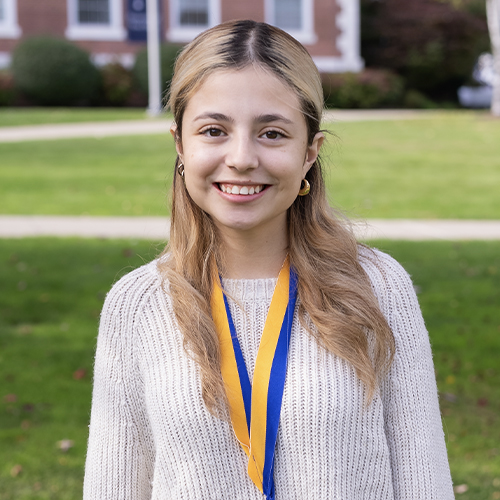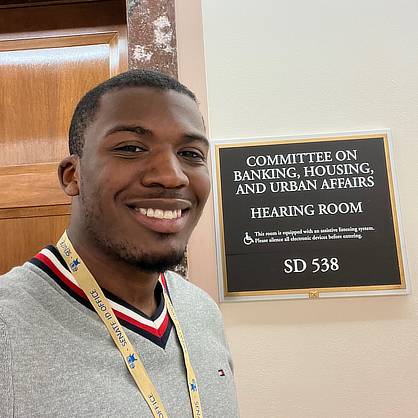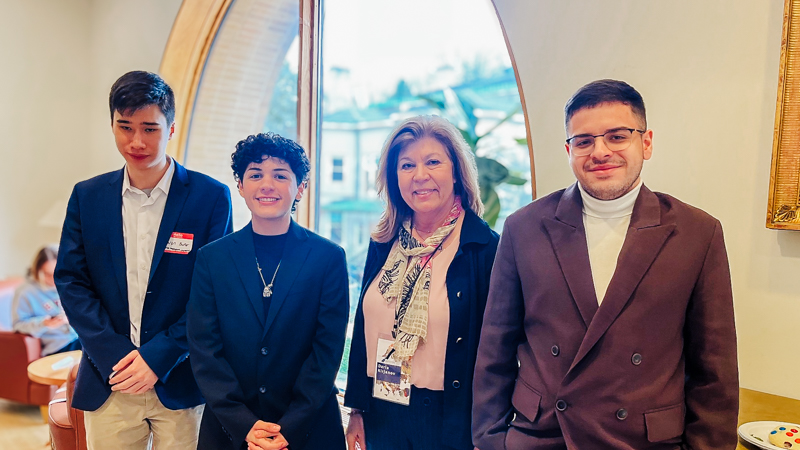
Nessy Cherazard '27
Nessy Cherazard shares her MUN journey, from stepping into her first simulation as a first-year student to standing at the forefront of an international debate.
Public Safety is tracking a significant snowfall that will be arriving in our area late Sunday morning (Jan. 25). It will snow heavily throughout the day and evening eventually tapering off Monday (Jan. 26) with 10-14 inches expected statewide. A sleet and freezing rain mix is also possible along the shore. Temperatures will be in the teens and twenties.
Due to this significant winter storm and the extensive campus clean-up operations that will need to take place, all in-person day and evening classes scheduled for Monday, January 26, 2026 have been cancelled. All scheduled in-person classes will transition to being held online or remotely. Additional information on the virtual format for each class will be provided by your instructor.
Faculty have been asked to prepare for Online or Remote sessions in the event of in-person meeting cancellations. These options will be determined by the Faculty member and all questions should be directed to the Faculty teaching each course section. Faculty also have been asked to be very understanding and accommodating of the individual situations of their students who may have difficulty managing these alternative online or remote class meetings on short notice.
Please note that only essential employees, as previously determined by their respective department leaders, should report to campus. All other employees should fulfill the requirements of their role remotely.
Campus operations for residential students, unless otherwise noted, will operate as scheduled, though hours may be modified or changed based on the conditions. Separate messages will be sent from the Peterson Library, the Beckerman Recreation Center, and Dining Services regarding any changes to their normal hours of operation. The Bergami Center for Science, Technology, and Innovation will remain open for residential students to use for study space and to participate in online classes.
Off-campus students that live in the City of West Haven should abide by the city’s parking ban during inclement weather to avoid having their vehicle tagged and towed. Please check the City of West Haven’s website for further information on their snow parking ban.
Governments, non-governmental organizations, businesses, and change agents – at the local, state, and national and international level – powerfully impact our lives.
As a political science major at the University of New Haven, you will develop an understanding of our complex political system and its players, and explore how and where you can make an impact.
Our faculty are leaders and innovators in their fields, bringing both deep professional experience and academic rigor to the classroom.

Nessy Cherazard shares her MUN journey, from stepping into her first simulation as a first-year student to standing at the forefront of an international debate.

Hatfield Scholar Aspires to Empower Immigrant Communities Through Legal Career

The people I met at the University gave me the best four years of my life.
Government Affairs Specialist
Flat Growth 2024-2034
Pollsters and Survey Designers
Flat Growth 2024-2034
Social Science Manager
4.5% Growth 2024-2034
Students will take a comparative look at the sociological, psychological, political, religious, and economic forces that drive and confront migration in Europe and the United States. Moreover, students will explore and discuss the consequences of various policies and social responses in receiving areas and apply these insights to contemporary issues of migration. At the conclusion of the course, students will deliver a policy brief that provides a prescriptive response to one of these issues.
In the globalized world of the 21st century, divisions created by territorial boundaries are gradually fading with growing integration and inter-connectedness between different nation-states. In today’s world, states, which operate as isolated entities, run the risk of jeopardizing their own national interest. In the background of this development, the proposed course will provide students with a clear understanding of the emerging trends of globalization, what led to the beginning of these trends and what are its current patterns. The course will especially focus on the most recent "global flows" and their impact, including global economic flows as reflected in the growing international trade; global political flows as observed in the internationalization of political issues; global cultural flows as discerned through cultural convergences; and global technological flows as witnessed by the Internet revolution. In addition, the course will also explore and analyze the issues of terrorism, global warming and migration, as an outcome of the process of globalization.
Model United Nations is an experiential learning course that provides students with the simulated, real world experience of turning political ideas into reality. Students serve as country delegates to the United Nations tasked with researching, creating, formulating, negotiating, and arguing for solutions to some of the most pressing global issues/problems. This course will involve the creation of a position paper, participation in a prep conference, in class simulations, and potentially the MUN conference in Washington D.C. or Canada. At the conclusion of the course, students will produce a series of reports and reflection papers synthesizing their research and thoughts about their experiences and learning.
This course introduces students to American politics through an introduction to the seat of federal power itself, Washington, DC. In content, the course focuses on international relations with an emphasis on American foreign policy. But this is not a policy course; it is a politics course. Students will study a range of foreign and domestic policy decisions, some historical, most contemporary, and in doing so will emerge with a deeper understanding of how such decisions are made.
The University of New Haven offers a wide variety of in-depth courses that create a transformational educational experience for our students. To view the complete list of courses you'll take while pursuing a Bachelor of Arts in Political Science, check out the Academic Catalog:
Double Major - English and Political Science, B.A.
Get an inside look at what differentiates the University of New Haven and how your experiences as a student will prepare you for success.




All University of New Haven students have access to the many resources available through the University’s Career Development Center, which has been named one of the best in the nation by The Princeton Review.
From career assessments, networking, and job shadowing to on-campus interviews and salary negotiation, the Career Development Center provides the skills and connections to identify a meaningful career and an opportunity to pursue your passion.
Learn More
The Charger Blog
University of New Haven students explored topics ranging from wartime trauma to disinformation campaigns while building academic and professional connections in the field of Russian, East European, and Eurasian studies.
Whether you're still in high school or are transferring from another college, we offer full- and part-time opportunities for undergraduates from inside the U.S. and abroad. The admission process can begin as early as the end of your high school junior year.
The Application Process
We offer a comprehensive financial aid program, with students receiving assistance in the form of grants, scholarships, student loans, and part-time employment. Funds are available from federal and state governments, private sponsors, and from university resources. More than 85 percent of the University's full-time undergraduate students receive some form of financial assistance.
Learn More